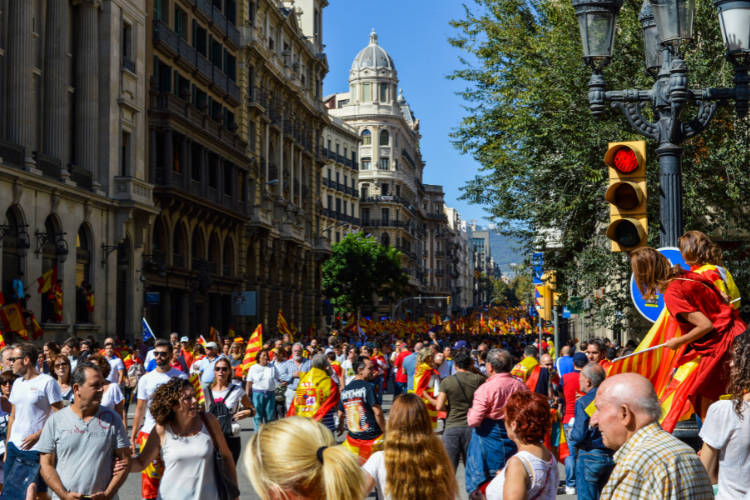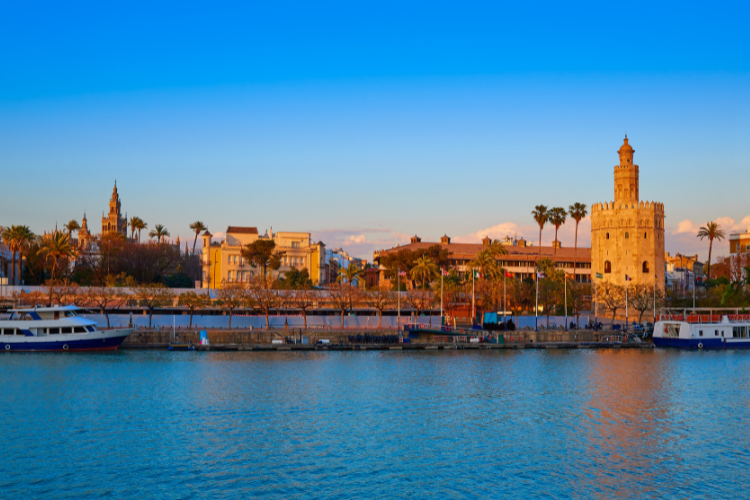Last Updated on April 10, 2025 by Maryam Siddiqui
Expats from all over the world are attracted to Portugal to live in a wonderful place with an enviable quality of life. But the important question is: is Portugal a gay-friendly country? What can LGBTQ+ people expect from everyday life here?
Relocating to a whole new country is a very brave thing to do, and dealing with cultural differences can be even harder when it touches on your own sexual orientation or gender expression.
In today’s article, learn the truth about the day-to-day life of being gay in Portugal, from the difficulties to the achievements. Check it out!
Is Portugal a gay-friendly country?
Yes, Portugal is considered to be a gay-friendly country. In fact, it has been pointed out as one of the most advanced in terms of recognition of LGBTQ+ rights in the world.
The Spartacus Gay Travel Index 2023 placed Portugal in the position of #4 most gay-friendly destination in Europe. So it’s great news for those looking to travel here.
But what about living in Portugal? Especially when it comes to protecting the rights of the LGBTQ+ community, Portugal stands out a lot from its European neighbors.
In recent years, Portugal has modernized itself a lot, not only with regard to its economy but also in terms of the values it wants to carry for the future.
As in the entire Western world, the representation of LGBTQ+ families is increasingly frequent on television. Of course, this does not mean that no people oppose integration and equality.
There is still a lot to be done for the LGBTQ+ community in Portugal to be properly respected. But at least the first steps have already been taken.
Gay rights in Portugal
Gay rights in Portugal have undergone several favorable changes over the last few decades. This traditional and almost old-fashioned country in the corner of Europe turned out to be an international example when it came to progressive legislation.
Especially after revolutionizing itself in 1974 and coming out of a long period under the domination of oppressive governments, Portugal began to value individual freedom openly.
It was the 8th country in the world to allow same-sex marriage and is one of the few which bans discrimination based on sexual orientation in the Constitution.
Juridical Achievements
Discover below the main juridical achievements of the LGBTQ+ community in Portugal in chronological order:
- 1984: Decriminalization of homosexuality;
- 1999: Homosexuals and bisexuals gain the right to enter the armed forces;
- 2001: Recognized by law the stable union of same-sex couples;
- 2003: Labor code law protects gay workers from discrimination;
- 2004: The Portuguese Constitution recognizes sexual orientation to be defended in the principle of equality;
- 2007: Portuguese criminal code starts to protect homosexuals from discrimination and physical offenses;
- 2009: Portuguese public schools begin to discuss the topic of homosexuality in the classroom;
- 2010: Portugal starts to allow and recognize same-sex marriage;
- 2011: Transgender persons were allowed to change their legal gender on identity documents;
- 2016: Portuguese law allowed the adoption of children by same-sex couples.
- 2017: Gender identity self-determination was introduced, allowing transgender individuals to change their legal gender marker without requiring medical intervention or judicial approval.
- 2018: Portugal implemented a law that banned discrimination based on gender identity.
- 2020: The National Health Service (SNS) in Portugal began covering gender reassignment surgeries.
- 2020: The Portuguese Parliament approved a law that allows transgender people aged 16 and older to change their legal gender.
- 2021: The Portuguese Parliament passed a law that prohibits conversion therapy.
In this way, a large part of the LGBTQ+ community in Portugal has their basic rights protected by law. And they can live their lives peacefully, as they should.
However, there is still much to be achieved in terms of making it safer and more inclusive.
What is it like to be gay in Portugal?
The country has made significant progress when it comes to the safety, legal rights, and inclusivity of all individuals. However, it’s important to acknowledge that some things can still be a challenge for many.
In terms of homophobia and representation, there has been progress in increasing LGBTQ+ visibility in media, entertainment, and politics. LGBTQ+ public figures and role models are becoming more prominent, helping to challenge stereotypes and foster greater acceptance.
People are free to live and work in Portugal, walk safely in the streets, and have the same rights as any other legal citizen. So yes, Portugal is a gay-friendly country.
Additionally, new laws have made it illegal to discriminate based on gender identity and aid gender reassignment surgeries. There’s also no discrimination if anyone from the LGBTQ+ community wishes to adopt a child and start a family.
While the country has come a long way in terms of acceptance, it’s essential to understand that some factors, such as location, individual beliefs, and social circles, can create distasteful experiences. We must collectively stand up for what is right to protect the rights of every individual and work towards acceptance and safety.
Where does the LGBTQ+ community live in Portugal?
In search of tolerance and respect, it is natural for LGBTQ+ people to be concerned about the neighborhood and receptivity to what is different.
The reception of gay travelers and expats varies according to the region of Portugal. Lisbon and Porto, as they are areas with the greatest diversity, are the ones where you will feel most comfortable expressing yourself.
Gay-friendly areas in Lisbon
Lisbon is, without a doubt, the best city for an LGBTQ+ person to live in. Here, there is greater cultural diversity and progressive cultural thinking in general. The best way to know whether Portugal is a gay-friendly country or not is to look around for places that makes it a safe space.
Young Lisbon is increasingly inclusive and globalized and knows that it has no place in the world of tomorrow with retrograde thoughts. Lisbon’s Pride is the most important in Portugal, and there are always nice events going on.
And let’s not forget the incredible gay nightlife in the city. The beautiful capital of Portugal manages to be both traditional and modern, making it a wonderful destination for expats from all over the world.
The best gay-friendly neighborhoods to live in Lisbon are in the Misericórdia parish, especially the areas Príncipe Real, Bairro Alto, and Santo António. João Valério, a resident of the region, gave his opinion to a report by Idealista:
“I have lived in Príncipe Real for 11 years. I chose to live here in this area because this is where I feel good. What this place particularly offers me is this logic that all of us, LGBT people, can occupy and feel safe in the public space, regardless of our sexual orientation, gender identity or expression.”
Also according to the report, other parishes in Lisbon are also starting to follow the example of the neighbor. Alfama, Arroios, and Lumiar are also considered gay-friendly areas in Lisbon.
While the cost of living in central Lisbon may be higher than in other areas, life here sure pays off.
You may be interested in knowing more about the gay atmosphere in Lisbon in the Essential Lisbon LGBT Travel Guide.
Gay-friendly areas in Porto
Living in Porto is also a popular choice among expats in Portugal. Known for being a diverse, cultural, and lively city, Porto also has its strong LGBTQ+ community and its own Pride parade.
It’s common to see gay couples enjoying tourist spots and cafés in this vibrant and beautiful place. As you can read in the Essential Guide To LGBT Travel In Porto, Porto’s gay nightlife is also famous.
The Porto Gay Circuit points out that the best gay-friendly neighborhoods in Porto are Ribeira, Cedofeita, and Baixa. These are all central areas of Porto and, as the big city feels really small, they have the best location in town.
Gay-friendly areas in the Algarve
This popular region in Southern Portugal is known for its beautiful coasts and numerous tourist attractions. But how many safe spaces does the region provide?
While there may not be exclusive neighborhoods for the LGBTQ+ community, the area is safe and inclusive for all.
The first area that is popular for its inclusivity is Albufeira. Known as the beach paradise, this city has various LGBTQ+-friendly bars like the Connection Bar, clubs, and events.
Then there’s Vilamoura, a resort town with a marina, golf courses, and a range of upscale restaurants and bars that do not discriminate against LGBTQ+ visitors.
Yet another city is Lagos, a historic town with picturesque beaches and a lively atmosphere. It’s also very popular among digital nomads who like to work near the beach.
If you’re the same, Meia Praia is a popular beach that attracts a diverse crowd. You can also spend your time well at the Luisol Rua de Sao José bar in Lagos.
- You may also like to read: Where Do Expats Live In Portugal? Find Your Community.
Adoption Process for gay couples
Is Portugal a gay-friendly country allowing an adoption process similar to that of opposite-sex couples?
Of course, yes. Adoption laws do not discriminate based on the sexual orientation or gender identity of the prospective parents. The Portuguese Civil Code and other relevant legislation govern same-sex couples’ legal framework for adoption.
Adoption in Portugal, regardless of the sexual orientation of the adopting parents, aims to prioritize the welfare and well-being of the child. The regulations to adopt are that the couple must be married or have a non-marital relationship longer than 4 years. And be between the age of 25 to 64 years old.
The process is usually as follows:
- Visit the Social Security service in your area;
- Attend an information session on the Training Plan for Adoption;
- Submit your application;
- Assessment & waiting list;
- Wait for an adoption proposal and then meet the child;
- The recognition of the child as the adopter’s child is requested by the court.
For detailed information, you visit the official government website.
Let’s Move to Europe
With Viv Europe your plans for Europe will come to a reality
Is homophobia still present in Portugal?
Although Portuguese law was at the forefront of allowing same-sex marriage, even before the United States, that doesn’t mean there isn’t homophobia here.
Portugal is a country known for its welcoming people. Indeed, they are one of the friendliest people in Europe. But Portugal is also a country with traditions deeply linked to Catholicism, and, like most societies today, it still has prejudices rooted in its culture.
It was only in 2017 that, for the first time, a Portuguese politician publicly came out as gay. State secretary Graça Fonseca chose to expose her sexuality in an interview to the newspaper Diário de Notícias because in her words: “Laws alone don’t change mindsets”.
Older generations, especially, show less acceptance of the theme. Yet LGBTQ+ youth also face prejudice among classmates. The Ex Aequo association revealed in a study that 79% of Portuguese youth have already witnessed episodes of homo-bi-transphobic bullying in schools.
See in the video below a Vox Pop made in Lisbon about what the Portuguese think about homosexuality:
Lisbon, Porto, and the Algarve don’t represent the entire country
It is important to mention that although Lisbon, Porto, and the Algarve have large LGBTQ+ communities, it doesn’t mean that all of Portugal does.
Especially in the small towns in the interior, people have stronger ties to tradition and religion. So for many locals, unfortunately, being gay is often not considered normal.
Thankfully, Portugal is not a violent country. It is a safe place, and cases of discrimination hardly ever lead to physical violence. As explained to the newspaper Público by Marta Ramos, the Executive Director of the ILGA Association:
“The difference [in Portugal] is that this discrimination is perhaps not so direct. It is not necessarily violence, but looks, comments, verbal insults.”
Portugal’s next challenge toward accepting and including LGBTQ+ people is a bit more complex than changing the Constitution. The challenge now is to adapt the cultural mindset to a place where all are truly welcome and free to be who they are.
A light at the end of the tunnel
A 2020 survey on the LGBTQ+ community in Europe, by the European Union Agency For Fundamental Rights (FRA), demonstrates that Portugal has many reasons to be hopeful for a more inclusive future.
To begin with, Portugal shows the lowest rates in the EU of physical or sexual attacks against LGBTQ+ people. Although 57% of respondents in Portugal admitted to always or almost always avoiding holding hands with people of the same sex, 68% stated that prejudice and intolerance have decreased in the five previous years.
There are indeed reasons to be optimistic. But we must never forget the daily struggle for the recognition of gay rights everywhere. At least Portugal is a gay-friendly country that has already gone far in making sure the law is fair.
Is it worth living in Portugal?
The only person who will be able to tell you if it is worth relocating somewhere is yourself. But Portugal does offer many advantages – regarding the quality of life and the friendliness of its people.
If you weigh the pros and cons of living in Portugal, you’ll probably come to the same conclusion as most people: yes, it’s worth it.
The best thing you can do to decide once and for all is to experiment before committing to the decision. Scouting trips are great for getting to know the cities firsthand and trying out different neighborhoods.
And above all, try to meet other LGBTQ+ people in Portugal. You will have tips from those who really know your reality. A great idea, for example, is to join the LGBTQ+ Expats, Immigrants & Friends in Portugal Facebook group.
Do you want to move to Portugal?
So what do you think after reading this article? Is Portugal a gay-friendly country?
Everyone deserves to live happily and in harmony, regardless of their sexual orientation. Portugal has already understood that the future is inclusive and spares no effort to adapt. Why not also experience the best southern Europe has to offer?
If you’re really planning on moving to Portugal, you’re not alone. Our Facebook Group – All About Portugal For Expats is growing daily with adventurers from all around the world. Ask questions and learn from others’ experiences!
Subscribe to our newsletter and keep up with our latest articles on everything you need to know about relocating and living in Portugal. If you need guidance on how to make your relocation dream come true, reach out to an expert from Viv Europe! We can help turn your dream into a reality!








